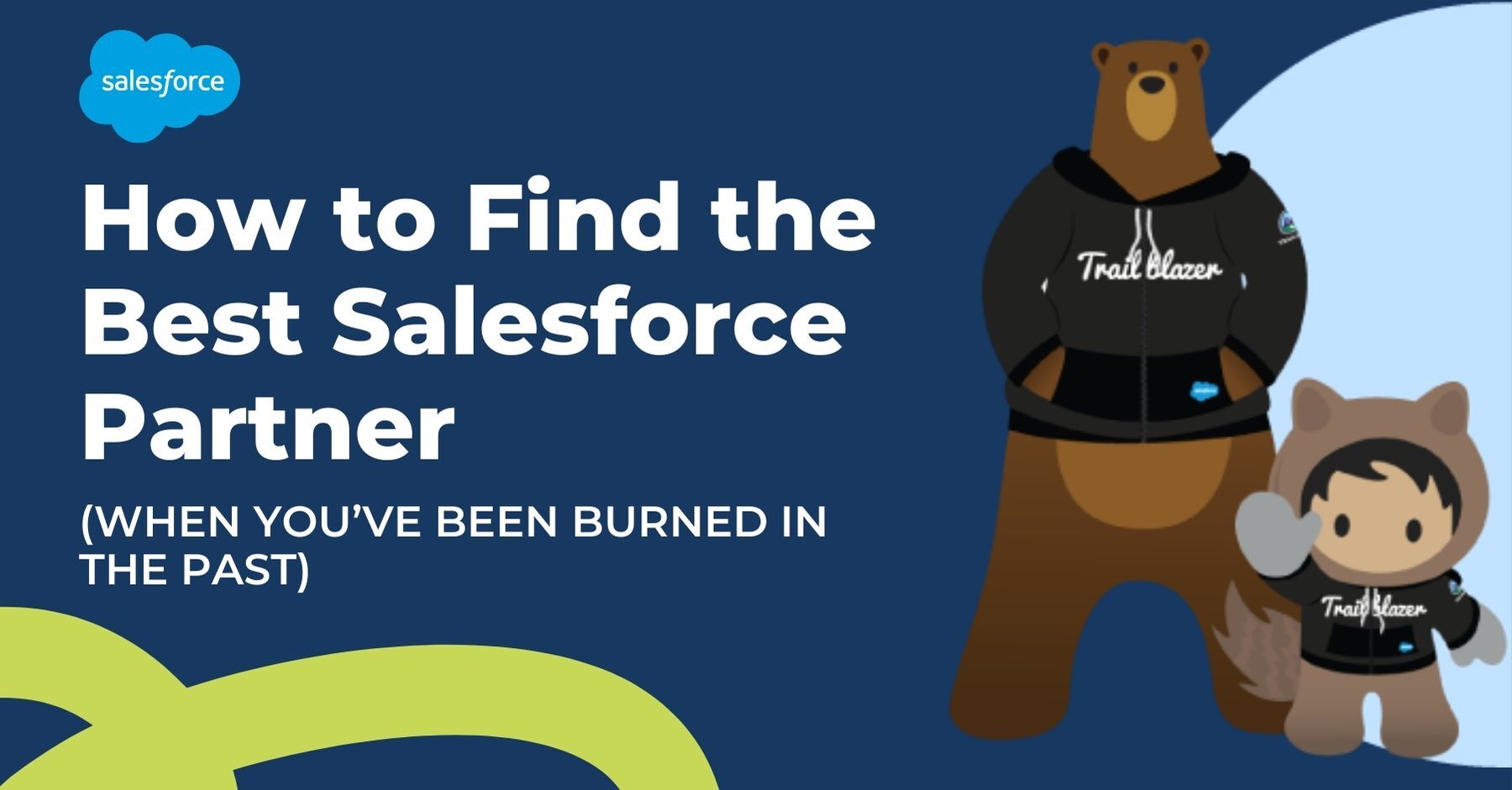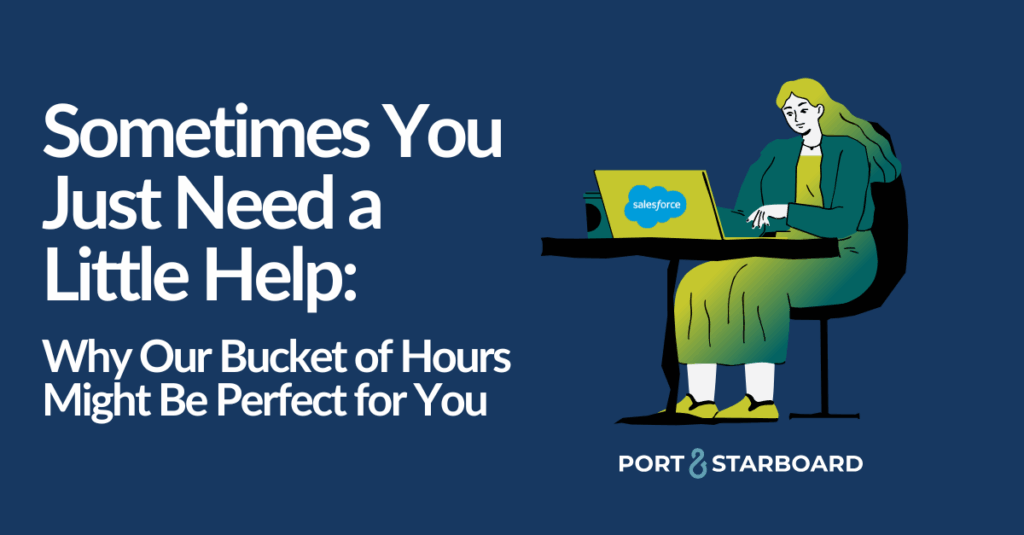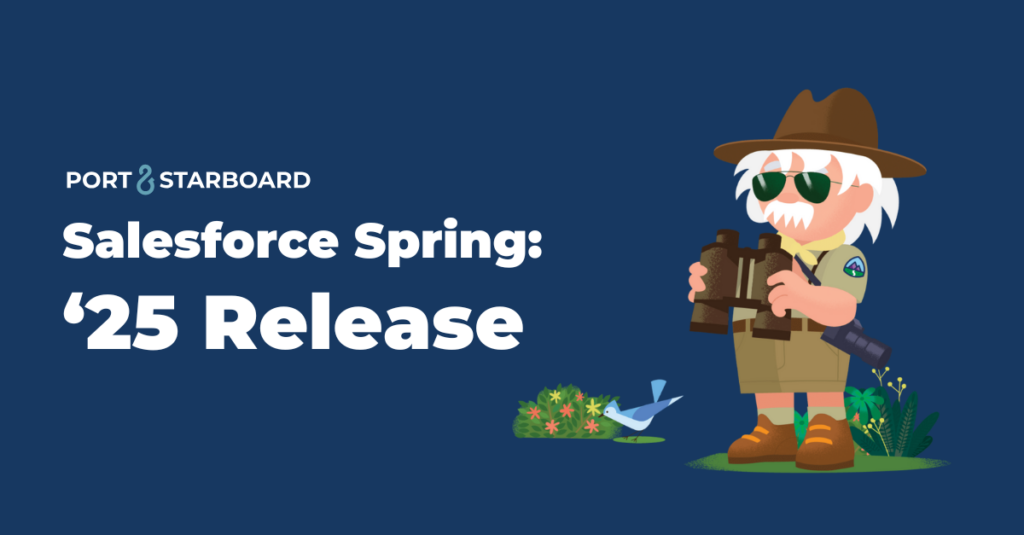Salesforce is a robust and adaptable Customer Relationship Management (CRM) system. Your business can use this powerful tool to track, manage, and analyze customer data, improve efficiency, and streamline your current client management software. Salesforce can also help improve your communications with partners, customers, and leads through all phases of the buyer’s journey.
The great news is that Salesforce is a highly customizable platform that can be tailored to your current business needs and adapted as your organization grows. The less-great news is that, most likely, you don’t already have the in-house resources to implement and manage Salesforce to meet your needs perfectly.
Don’t worry – you’re not on your own. The Salesforce partner community has many trained development partners who can help your company get the most out of this powerful CRM. But how do you choose the Salesforce partner that’s right for you? Let’s dive in and find out.
What can a certified Salesforce partner offer?
Salesforce lists certified Salesforce partner companies and individuals in its partner community portal, but the sheer number of professionals to choose from can be overwhelming. As a start, it’s important to understand what each type of Salesforce Partner does.
- Consultants, Agencies, and System Integrators (SIs) help identify the features your business needs and then design, develop, implement, and maintain the Salesforce solutions that work best for you.
- Independent Software Vendors develop custom software solutions that integrate with the Salesforce platform to address your business’s more specialized needs.
- Reseller Partners resell or distribute Salesforce products.
Each type of Salesforce partner works together to ensure customers get the Salesforce products and support they need for their systems to run optimally.
How to Choose the Right Salesforce Partner
As you set out on your Salesforce journey, choosing a partner that’s right for your organization is vital. Most organizations don’t have full-time, in-house Salesforce admins or SIs. Instead, they engage a Salesforce consulting firm or independent consultants as needed.
The following tips can help you narrow your Salesforce partner list and find the best consultants for your needs.
1. Do your research.
Some things never change. Whether hiring an electrician, attorney, or Salesforce partner, you should always start with research. Reach out to your Salesforce Account Executive (if you have one) and poll other customers in Salesforce user groups. Read online reviews, testimonials, case studies, and other feedback about other users’ experiences. (You can check out reviews on the Salesforce AppExchange). Consider asking for recommendations from friends, colleagues, professional agencies, and others in your industry to get more insider information.
Once you have a few Salesforce partners in mind, verify their credentials, investigate their experience, and ask them to provide some references from other customers.
2. Make sure your values and vision align.
Your business stands out because it’s unique. Make sure your Salesforce partner understands how and why you’re different from others in your niche and what you value most. For example, if your business prioritizes real-time adaptation to customer analytics, your Salesforce partner must also make that a priority. If your organization sets itself apart through transparency, integrity, or lightning-fast response time, your partner should share similar values.
Beyond ensuring your consultant has their priorities straight, ensure you can easily communicate with them how you want, when you want, and via your preferred channel: by text, email, telephone, in-person, or however you communicate best.
3. They need to understand your industry.
The ideal Salesforce partner will have experience implementing solutions for a variety of industries as well as expertise specific to your industry. This diversity of experience will help them understand your particular needs and pain points and how others use Salesforce to best solve their problems.
Experience customizing Salesforce and integrating add-ons for your industry can help make implementation more efficient and cost-effective. Your partner should also understand any specialized rules that apply to your industry, such as confidentiality or other security issues. This can help you avoid potential liability issues and reduce your exposure.
4. Make sure they’ve worked on similar products in the past.
In addition to understanding the needs of similar clients in your industry, the best Salesforce partner for you will have experience working on projects like yours.
If you’re a multinational corporation with dozens of regional offices, look at Salesforce partner companies specializing in large-scale implementation. Conversely, if you’re a startup with very specialized, small-scale operational requirements, seek out a partner that helps small businesses with niche needs. Ask your potential Salesforce partner for references or case studies illustrating their relevant industry and project experience.
5. Check into their Salesforce certifications.
Salesforce offers over 40+ certifications, including:
- Certified Salesforce Administrator
- Certified Salesforce Advanced Administrator
- Certified Salesforce Sales Cloud Consultant
- Certified Salesforce Service Cloud Consultant
- Certified Salesforce Platform App Builder
- Certified Pardot Specialist and Consultant
A consultant should at least hold an Administrator certification. However, you may want to hire a Salesforce partner with additional credentials if you have specialized needs.
6. Make sure they offer sufficient and ongoing support.
Your company may need a Salesforce partner that provides full-service 24/7 support (either remote or on-site). Or you may be satisfied with a partner that responds to issues within a few hours and bills for on-demand services. Ensure your Salesforce partner’s team is large enough and has the necessary expertise and knowledge to fulfill your needs.
In addition to meeting day-to-day service needs, consider how your Salesforce partner will help you manage updates and scale over time. Salesforce continuously evolves to fix issues, introduce new tools, and improve existing features. SFDC (Salesforce.com) issues updates three times per year. Your Salesforce partner should help you prepare for and implement these updates, troubleshoot any issues they may cause, and help your team stay current on best practices for users in response to change.
7. Focus on quality over quantity.
Salesforce partners aren’t a one-size-fits-all solution. Partners may offer different service plans to fit your company’s needs and budget. If you don’t need 24/7, 365-day support or specialized technical oversight, you may not want to pay for a plan that includes them.
Your Salesforce partner should be able to explain exactly what services they offer and how they’ll specifically benefit your company. Don’t cut corners on the services that help your business, but don’t waste money on extras you don’t need, either.
8. Make sure your partner is growth oriented.
One of the best attributes of Salesforce’s cloud-based solutions is its adaptability to the changing needs of your organization. As your company grows, your Salesforce partner can help you configure and optimize the platform’s features to scale with you rather than completely overhauling your system.
Scaling successfully requires planning for growth from your system’s initial design and implementation. Your Salesforce partner should understand how your business may change in the future and chart a course with appropriate resources to enable and encourage growth.
Is your current Salesforce partner a bad fit?
Have you already implemented Salesforce and are unsure if your current Salesforce partner is a good fit? Maybe you’ve been burned so badly by a past partner that you’re not sure whether to move forward with Salesforce at all. If any of the following ring true, your implementation is in distress and may need bailing out.
- You feel like you’re overpaying your current Salesforce partner but not getting the level of service you desire.
- You don’t understand virtually anything your Salesforce partner tells you.
- You have a team of users that hate using Salesforce because they weren’t adequately trained on it.
- You feel your platform is a mess of workarounds or botched implementations.
- Your business needs have changed, and your existing partner doesn’t have the technical background or resources to implement necessary integrations or add-ons.
It may be time to cut the line and let your Salesforce partner loose. Whether you’re preparing for a new implementation or struggling with an existing implementation, it’s not too late to find a better crew. That’s where we come in.
Hail the Port & Starboard Crew
If your crew is in distress, our experienced team of Salesforce consultants is ready to help. We’re a certified Salesforce consulting partner with all the tools necessary to right any sinking ship. Our Save our Salesforce (SOS) program will identify the shortcomings or issues in your current Salesforce implementation and set you on a course for success. Contact us today for a no-obligation consultation.





